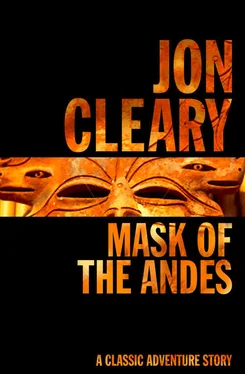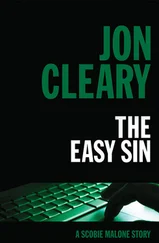Jon Cleary - Mask of the Andes
Здесь есть возможность читать онлайн «Jon Cleary - Mask of the Andes» — ознакомительный отрывок электронной книги совершенно бесплатно, а после прочтения отрывка купить полную версию. В некоторых случаях можно слушать аудио, скачать через торрент в формате fb2 и присутствует краткое содержание. Жанр: unrecognised, на английском языке. Описание произведения, (предисловие) а так же отзывы посетителей доступны на портале библиотеки ЛибКат.
- Название:Mask of the Andes
- Автор:
- Жанр:
- Год:неизвестен
- ISBN:нет данных
- Рейтинг книги:5 / 5. Голосов: 1
-
Избранное:Добавить в избранное
- Отзывы:
-
Ваша оценка:
- 100
- 1
- 2
- 3
- 4
- 5
Mask of the Andes: краткое содержание, описание и аннотация
Предлагаем к чтению аннотацию, описание, краткое содержание или предисловие (зависит от того, что написал сам автор книги «Mask of the Andes»). Если вы не нашли необходимую информацию о книге — напишите в комментариях, мы постараемся отыскать её.
Mask of the Andes — читать онлайн ознакомительный отрывок
Ниже представлен текст книги, разбитый по страницам. Система сохранения места последней прочитанной страницы, позволяет с удобством читать онлайн бесплатно книгу «Mask of the Andes», без необходимости каждый раз заново искать на чём Вы остановились. Поставьте закладку, и сможете в любой момент перейти на страницу, на которой закончили чтение.
Интервал:
Закладка:
‘You. The one thing I remember about you was that you were never scared. Cautious, yes, but never frightened of anything. That time you were home from school on vacation and the burglars broke into the house. You locked Mother and me in her bedroom and went downstairs on your own. The guys, whoever they were, heard you coming and ran. But you went down there, that was the thing – you were my hero for a day or two.’
‘I was scared stiff,’ he said, not asking why he had remained her hero only for a day or two.
She nodded towards the house. ‘What were you then – cautious or scared?’
‘Cautious, I guess. It’s the only way to get by up here. Nobody here, neither the criollos nor the campesinos, accept you on your own terms. It’s their terms all the time or nothing.’
‘Is that why you haven’t made much of your life here so far?’ He nodded and she put her hand sympathetically on his again. Then she said, ‘That was my mistake, I think. I tried living on my own terms. I’ve only just discovered I was never really sure what they were.’
‘Then we’re alike,’ he said, and she looked pleased. ‘I’m never quite sure about people who say they’ll only live on their own terms, whether they’re conceited or selfish or just insecure. I’ve never been convinced it’s an entirely noble attitude.’
‘ “To thine own self be true” –you think Polonius was wrong?’
‘In the Church, anyway, I’ve never found him proved right.’ He stood up, smiling now to divert her from what he had just let slip; it was too soon, he did not know her well enough yet, to confess his doubts. ‘I better go see what the Bishop wants.’
She stood up beside him. ‘You’re not annoyed because I came, Terry?’
‘No. I’m glad,’ he said, and meant it. He had reached a depth of loneliness where reunion even with someone half a stranger had its comfort. ‘Will you be staying long?’
‘A week or two. Until we get to know each other again.’
‘Will you stay here?’ He nodded at the house.
‘Depends. Not if Pancho becomes too possessive.’
‘Is it serious with him?’
‘On my part, you mean?’ She shook her head. ‘He’s the latest in a long line. I haven’t been a very good girl – the nuns at Marymount must be wearing out their rosaries praying for me. I’m not exactly the right sort of sister for a priest. I think I have too much of Dad in me.’ She smiled wryly, nothing at all like the brash girl he had met an hour earlier. ‘Father, forgive me, for I have sinned—’
‘Who hasn’t?’ he said, unembarrassed.
He left the Ruiz house and drove back to the main plaza. The benches in the square were now occupied by old men dressed in old-fashioned dark suits, their wary faces hidden in the shade of broad-brimmed felt hats; they looked like retired gangsters from movies of the thirties, men who had stepped out of frame but not out of costume. But McKenna knew that they were not as interesting as old-time gangsters. They were just middle-class criollos living on dreams that were as dim as their eyesight, selling off their possessions piece by piece, hoping that at the end they would have enough left to pay for a funeral befitting their blood. A flock of young children, criollos and mestizos, wafted up the broad steps of the cathedral, two nuns fluttering behind them like Black Orpington hens. An army truck went round the plaza and pulled up outside the prison on the other side of the square. Half a dozen prisoners, all Indians, chained together, got down from the back of the truck and were pushed through the small door in the tall wooden gates. The truck drove off and that side of the square was once more quiet and deserted. No one in the square had done more than glance casually across at the prisoners. Too much interest, McKenna knew, might have brought an inquiry from the security police on the third floor of the government palace on the northern side of the plaza. He looked across and saw the man at the third floor window: the sun flashed on his binoculars as he turned them from the prison gates on to McKenna himself as the latter got out of the Jeep outside the Bishop’s palace. For one mad moment the priest wanted to turn and jerk his thumb at the watcher, but reason prevailed. You did not make rude gestures in front of the Bishop’s palace, certainly not at the security police.
As McKenna crossed the tessellated pavement a small boy flung himself at his feet; but he was not a juvenile sinner seeking absolution, just a bootblack claiming the Americano padre could not visit the Bishop with dirty shoes. McKenna submitted to the blackmail, gave the boy a lavish tip, then went into the palace spotless at least up to the ankles. Behind him the bootblack, clutching half a day’s income in his hand, told him he was a saint.
If it were only so easy, McKenna told himself.
Bishop Ruiz was in his study reading The Wall Street Journal ; he nodded at it as he put it down. ‘There are so many Bibles to get through these days. Do you read it, Padre McKenna?’
‘No, your grace. I am stupid when it comes to understanding high finance.’
‘Your father never taught you anything about it? He was a rich man.’
‘My father used to say that a fool and his father’s money are soon parted, so he never gave me any. Not till he died.’
‘I knew him when he owned the San Cristobal mine. I was a young priest then – I baptized you, did you know that?’
‘No,’ said McKenna, and wondered if he was expected to feel honoured. He also wondered how much the Bishop, a wealthy man even as a priest, had charged for the service.
‘I used to go out and say Mass for the miners. Your father would count the heads at Mass and then give me an American dollar for each one – he always seemed to have a bank of dollars. He would joke that he was buying his way into Heaven on the bended knees of the Indians.’
‘What did the Indians think of him?’ McKenna had never known the Bishop to talk of his father before and he wondered if this was the reason he had been brought here. The Bishop had chosen to speak in Spanish and that meant this was more than just a social call. McKenna was puzzled, seeking a connection between himself and his father that would concern the Bishop, but he could think of none. Even the older Indians up on the altiplano, ones such as Jesu Mamani, had never asked McKenna about his father.
Bishop Ruiz hesitated, then said, ‘I do not know, to be truthful. I have never known the miners to love any of the mine owners.’
They didn’t love my father, McKenna thought. You know the truth about him but you can’t condemn him because that would mean condemning your own kind.
‘When your father sold out to that other company, they worked the mine out in five years, drove the miners like dogs, then closed it down and went home. They left a caretaker-manager and his wife there, Americans. When the revolution came in 1952, the miners went back there and killed them – horribly. I saw the bodies—’ He shook his head, worked his mouth at an old vile taste, shuddered because he knew the future might one day taste the same. ‘The miners all went to communion the next morning and the priest up in Altea, poor Padre Luis, was too frightened to turn them away from the altar rail. He was afraid they would have killed him, too, if he had refused them.’ He looked across his wide, leather-topped desk at McKenna. ‘Those are the sort of people you are dealing with, my son.’
Now he’s getting to the reason for my being here, McKenna thought. But he was still puzzled: ‘I don’t think they connect me with the mine. What that other company did, I mean. As for what my father did—’ He tailed off, not wanting to condemn his father to this man who would give absolution too easily, because his own money came from the same sort of exploitation.
Читать дальшеИнтервал:
Закладка:
Похожие книги на «Mask of the Andes»
Представляем Вашему вниманию похожие книги на «Mask of the Andes» списком для выбора. Мы отобрали схожую по названию и смыслу литературу в надежде предоставить читателям больше вариантов отыскать новые, интересные, ещё непрочитанные произведения.
Обсуждение, отзывы о книге «Mask of the Andes» и просто собственные мнения читателей. Оставьте ваши комментарии, напишите, что Вы думаете о произведении, его смысле или главных героях. Укажите что конкретно понравилось, а что нет, и почему Вы так считаете.












